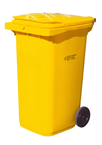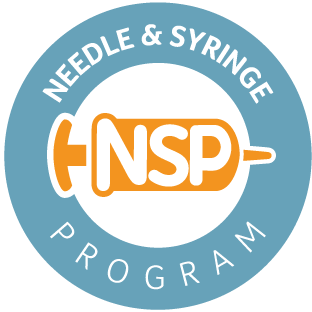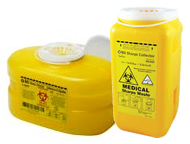Frequently Asked Questions
What is the Pharmacy Needle and Syringe Program (PNSP)?
The Queensland Needle and Syringe Program (QNSP) aims to reduce the incidence of blood-borne viruses and injection-related injuries and disease in Queensland by:
 Providing sterile injecting equipment
Providing sterile injecting equipment- Facilitating the safe disposal of used injecting equipment
- Improving access and referral to drug treatment programs, health care, and other services.
This is achieved through a network of 150 public needle and syringe programs and over 900 community pharmacies.
Significant public health risks associated with injecting drug use include:
- transmission of blood-borne viruses (HIV, hepatitis B and hepatitis C) through shared injecting equipment
- injection-related injuries and diseases including abscess, cellulitis, endocarditis, septicaemia and loss of limb.
The PNSP is funded by the Communicable Diseases Branch of Queensland Health and is administered by The Pharmacy Guild of Australia, Queensland.
To be part of the PNSP, participating community pharmacies must:
- Order a range of Queensland Health sterile injecting equipment (sharps packs) using the approved PNSP process. The Queensland Health sterile injecting equipment (sharps packs) are supplied free of charge to the pharmacy.
- Supply the Queensland Health sterile injecting equipment (sharps packs) to customers for a set fee of $3 (incl. GST) per pack.
- Commit to staff training on harm minimisation principles and program support.
Who funds the PNSP?
The Pharmacy Needle and Syringe Program is funded by the Communicable Disease Branch (Blood Borne Viruses and Sexually Transmissible Infections Program) of Queensland Health. The PNSP aims to reduce the incidence of blood-borne viruses and injection-related injuries in Queensland.
Why are people who inject drugs provided with sterile needles and syringes?
NSPs are an important public health measure. These programs have successfully reduced re-use of injecting equipment and associated injection-related harms and the sharing of injecting equipment, therefore preventing the spread of blood-borne viruses among people who inject drugs.
How many sharps kits can I sell to clients at any one time?
Participating pharmacies should not limit the number of sharps kits a client can purchase at any one time. The purpose of supplying subsidised sterile injecting equipment to clients is to minimise re-use and sharing of needles and syringes.
Who is clean injecting equipment funded for?
Clean injecting equipment is funded by Queensland Health and provided at no cost to participating community pharmacies with the intent that it is sold a nominal price ($3) to people who inject illicit drugs.
That means that for people who purchase prescription injectable medicines who may require injecting equipment should not be sold sharps packs that have been ordered as part of the PNSP. These patients should be sold injecting equipment sourced privately from a pharmacy wholesaler.
Who is sharps disposal funded for?
If your pharmacy has a 120L sharps disposal bin funded by the PNSP, you should only accept sharps waste from people who inject drugs.
We understand that many pharmacies accept sharps waste from people who use prescription injectable medicines, however, as the volume of medicines in this space continues to increase, the program cannot continue to support this.
If you have a large patient base wanting to dispose of sharps waste been generated from injectable medicines, we encourage you to invest in a separate sharps disposal bin paid for privately by the pharmacy.
As a reminder, whoever generates the sharps waste is responsible for its disposal. Your pharmacy is not obliged to accept sharps waste if you do not have the means to safely dispose of it.
Where can I refer people to dispose of their sharps waste if I do not have a sharps disposal bin?
You can refer clients to other pharmacies participating in the PNSP to dispose of their sharps, alternatively, depending on the council in which your pharmacy is located, disposal in domestic waste may be possible. You are strongly encouraged to contact your local council to confirm.
Many hospitals provide disposal facilities and some councils will also have public disposal bins, sometimes at major waste facilities. Again, you are strongly encouraged to contact your local hospital and council to confirm disposal options.
What support services are available to people who inject drugs?
Primary and Secondary Needle and Syringe Program sites offer support services and referral services for people who inject drugs. Click here for a list of all the primary and secondary sites in Queensland.
For information regarding the location of your nearest alcohol, tobacco and other drug service, please call the 24-hour Alcohol and Drug Information Service on 1800 177 833.
What useful information can I provide to people who inject drugs?
The aim of the PNSP is to reduce the incidence of blood-borne viruses and injecting related injuries and disease.
The following documents may be useful to educate about safe injecting practices and ways to minimise the transmission of various infections.
- Safer Using – NSW Users and AIDS Association
- Staying Safe - ADIS
- Injecting Vein Care Guide - AIVL
What containers must be used for the safe disposal of sharps waste?
Sharps waste must be housed in a rigid-walled, puncture resistant container with a secure lid. Cardboard boxes, plastic bags, plastic milk bottles, soft drink bottles, glass jars and plastic take-away containers are NOT suitable containers for sharps disposal.
If a patient returns sharps waste in an inappropriate container or as loose sharps, they should be informed that the pharmacy is unable to accept sharps waste unless contained in an appropriate sharps disposal container.
If you do not have a 120L sharps bin, or your sharps bin is full, you must not accept sharps waste as this presents a workplace health and safety risk for you and your staff.
Click here for the Pharmacy Needle and Syringe Program Sharps Disposal Poster.
What if someone finds a loose needle or syringe?
If a loose needle or syringe is found, the preferred option for disposal is to contact the Needle and Syringe Helpline (1800 633 353) or local council in your area. They will usually arrange for the needle and syringe to be collected within 48 hours.
Alternatively, the loose needle or syringe can be placed in an appropriate sharps disposal container to be disposed of. If this is not possible, the loose needle or syringe should be placed in a rigid-walled, puncture-resistant hard plastic container with a securable screw top. It is important to not attempt to replace the cap on the needle but instead pick up the needle or syringe by the barrel or plunger (keep away from the sharp end of the needle). Gloves and other protective equipment should be used at all times.
Where can I find more training and information?
- The Needle and Syringe Program Queensland CPD Accredited Module
The module is suitable for all staff involved in the NSP and you are encouraged to share it with your teams.
The module is hosted by the Australasian College of Pharmacy and is available at no cost to College subscribers. The module can be accessed here.
- Insight’s elearning module on the Queensland Needle and Syringe Program
This Needle and Syringe Program Training is an educational resource presenting concepts, knowledge and skills required to work effectively as a Needle and Syringe Program (NSP) worker in Queensland. The module is available here.
- Queensland Needle and Syringe Program Guidelines available here.
Where can I access procedures for the Pharmacy Needle and Syringe Program?
Please click here to access policies and procedures
How do I order sharps packs?
Click here to order Queensland Health sterile injecting equipment (sharps packs). Sharps packs are fully funded and are available free of charge to PNSP registered pharmacies for sale to clients. Sharps packs must be sold at a set price of $3 (incl. GST) per pack as specified in the program requirements.
How long will it take my sharps packs to arrive once ordered?
Please allow approximately 5-10 business days for order processing and delivery. Orders for regional pharmacies may take longer.
Please note that sharps orders are processed once per week at 8am on Monday.
How do I organise collection of the full 120L sharps disposal bin?
Pharmacies that have a funded 120L sharps bin are eligible to receive TWO bin collections and replacements per financial year.
- Collections must only be arranged through submitting an online bin collection request. Please do not call the phone number on the 120L sharps disposal bin. Click here to find the form to request collection of your full 120L sharps disposal bin.
- Collection and replacement of the 120L sharps disposal bin occurs at the same time (direct swap). The contractor will bring a replacement bin to the pharmacy on the day of collection.
- Please note: in regional areas it may take up to four weeks for collection and replacement of the 120L sharps disposal bin.
- Please do not overfill the sharps disposal bin. If the bin has been overfilled, the contractor may refuse collection due to occupational health and safety concerns.
- For pharmacies that lock their bin with a padlock, please ensure your bin is unlocked on the day of collection.
What can be put into the 120L sharps disposal bin?
- The 120L sharps disposal bin is funded by the NSP to dispose of sharps waste generated by people who inject drugs This means that you must NOT use the funded bin for vaccine-generated waste, or to dispose of large volumes of sharps generated from patients prescribed injectable medicines.
- Pharmacies must NOT accept sharps waste from commercial businesses such as medical centres, aged care providers, hairdressers or tattooists etc.
- Sharps waste ONLY is to be placed into the 120L sharps disposal bin. Unwanted and expired medications, medical and general waste should not be placed into the bin.
- Loose sharps CANNOT be placed into the 120L sharps disposal bin. All sharps must be housed in an appropriate rigid-walled, puncture resistant container.
Click here for the Pharmacy Needle and Syringe Program Sharps Disposal Poster.
Where should I store the 120L sharps disposal bin?
The 120L sharps disposal bin needs to be stored in a lockable area. This means the bin needs to be located within the pharmacy and NOT outside the pharmacy. Pharmacies must have the 120L sharps disposal bin located in an area that cannot be easily accessed by unsupervised children.
How do I lock the 120L sharps disposal bin?
The majority of 120L sharps disposal bins have a small chain that allows the lid of the bin to be locked. Pharmacies will need to purchase a small padlock to lock the bin. Locking the bin is recommended, but please ensure the bin is unlocked when the contractor collects the bin.
What should happen in the event of a needlestick injury?
In the event of a needlestick injury, the staff member should immediately notify their manager and be referred to their GP or local hospital for assessment. Click here for procedures and information regarding needle stick injuries
Please notify the PNSP at the Guild on 07 3831 3788 or via pnsp@qldguild.org.au within 48 hours of any needle stick injury. In addition, the pharmacy manager should document the incident in their incident reporting system.

